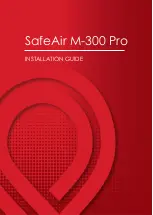
14
15
English
English
6 TrIM adJuSTMeNT oF The CoNTrol
The correct trim is a basic requirement for fault-free flying behaviour of the quadrocopter.
The adjustment is easy, but requires some patience and feel. Please observe the following
instructions precisely: Carefully move the thrust control up and raise the quadrocopter
approximately 0.5 to 1 metre in altitude.
6A If the quadrocopter moves by itself slowly or quickly to the left or right …
press the roll trim incrementally in in the opposite direction
(2E)
.
6B If the quadrocopter moves by itself slowly or quickly around its own axis …
press the yaw trim in the opposite direction
(2D)
.
6C If the quadrocopter moves by itself slowly or quickly forwards or back-
wards …
press the nick trim incrementally downwards
(2G)
. If the quadrocopter moves back-
wards press the nick trim upwards
(2G)
.
7 FlIghT CoNTrol
Note:
Only minimal corrections of the controls are necessary for a smooth flying behaviour
of the quadrocopter! The direction information applies if the quadrocopter is viewed
from behind. If the quadrocopter is flying towards the pilot, it must be moved in the
opposite direction.
Setting the control:
By pressing the control for pitching and rolling
(2F)
, the sensitiv-
ity of the control can be adjusted in three steps (Easy, Normal and Expert). In “Easy”
mode, the Power LED is green; in “Normal” mode, the Power LED flashes green; and
in “Expert” mode, it flashes red.
Attention!
Only switch to the higher level when you
have mastered the lower one!
7A
In order to start or gain altitude, carefully move the thrust/yaw control forward.
7B
Move the thrust/yaw control back for landing or to fly lower.
7C
To fly forward, carefully move the nick/roll control forward.
7D
To fly backward, pull the nick/roll control back carefully.
7E
To fly to the left, carefully move the nick/roll control to the left.
7F
To fly to the right, carefully move the nick/roll control to the right.
7G
To fly the quadrocopter around to the left, move the thrust/yaw control to the left.
7H
To fly the quadrocopter around to the right, move the thrust/yaw control to the
right.
7I
Looping - for experienced pilots only!
Once you have mastered your quad-
rocopter, you can try your hand at the stunt flying function. To do so, switch the
sensitivity of the controller to "Expert" and make sure that you have sufficient room
in all directions (at least 10 m). Also comply with the safety height – fly at a height
of at least 5 m, as your quadrocopter loses height when rolling over and has to be
caught and corrected afterwards! Please note: Rolling manoeuvres are more success-
fully executed when the battery charge level is near full!
Now climb to safety height. Quickly press the nick/roll control forward (until the flight
level is tilted more than 30° from the ground) and back again. The quadrocopter
performs a backward roll - rolling in the other directions can be controlled through the
corresponding movements of the nick/roll control. Be ready to catch the quadrocopter,
as the altitude, direction and speed after the roll depend largely on the wind and
previous flight movements.
4 ChargINg The QuadroCopTer
Attention:
The battery and motor must cool down for 10 to 15 minutes before charg-
ing and after every flight. Otherwise they can be damaged. The charging process must
be constantly monitored. Always ensure that the charging process takes place on a
fireproof surface in a fire-resistant environment.
• Unplug the helicopter from the battery and switch off the remote control
(4A)
.
• Remove the battery from the battery compartment (do not hold by the cable!)
(4B)
.
• Plug the charging unit into an unoccupied USB port and then connect the battery to
the charging unit
(4C)
. The charging unit illuminates.
• The charging process lasts approx. 50 minutes and must be continuously monitored.
The light on the charging unit goes out when the charging process is finished.
• Disconnect the battery from the charging unit and disconnect the charging unit from
the USB port after the charging is completed.
The quadrocopter can fly for approx. 5–7 minutes after a charge time of
approx. 50 minutes.
Warning notice:
The LiPo battery can become warmer during charging. If it should
become hot and/or changes to the surface begin to appear, immediately discontinue
the charging process!
5 STarT preparaTIoN
The thrust control (the left control on the remote control) must point down before
switching on
( 5A)
. Then move the ON/OFF switch to the "ON" position. The Power
LED
(5B)
starts flashing. Connect the battery cable with the connecting cable
(5C)
. The
LEDs on the quadrocopter now start flashing red. Place the quadrocopter on the ground
so that the tail points toward you
(5D)
. The quadrocopter needs around 5-10 seconds
to initialise the gyro and to establish the connection to the remote control. As soon as
the LEDs on the quadrocopter are permanently illuminated blue, the connection to the
remote control has been established.
Attention!
Always place your quadrocopter on an even horizontal surface – the control
electronics aligns its neutral position to the subsurface!
3 INSerTINg BaTTerIeS (reMoTe CoNTrol)
3A
Unscrew the screw
and slide the cover
downwards.
3C
Slide the cover
upwards and
screw it in place.
3B
Insert 4 x 1.5 V AA batteries
and pay attention to the polar-
ity specifications, as indicated
in the battery compartment.
2 reMoTe CoNTrol
2A
Antenna
2B
Thrust trim
2C
Control for thrust and yaw
2D
Yaw trim
2E
Roll trim
2F
Control for nick and roll
2G
Nick trim




























